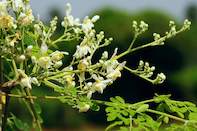The small fast-growing and hardy Moringa oleifera tree is also known as the drumstick tree, horseradish, been oil tree or ‘peperwortelboom’ in Afrikaans. Growing between 5 and 12 m tall, it has a straight trunk and and umbrella-shaped crown of feathery green leaves.

Flowers are up to 25 cm long and produce thin and long reddish brown seed pods. Although native to India, Pakistan and Nepal, Moringa oleifera grows in the Limpopo, Free State, Mpumalanga, KwaZulu-Natal and Gauteng provinces of South Africa. According to traditional African and Indian (Ayurvedic) medicine moringa has almost 540 compounds that can treat or prevent about 300 health issues.
The fact that moringa is easily cultivable makes it a sustainable remedy for malnutrition - countries like Senegal and Benin treat children with moringa. Moringa products range from leaf extract, powder and tablets to protein shakes, seed oils, teas and probiotic drinks.
Moringa leaves can be harvested by cutting the top of the plant off when the plant has grown to 1 m, leaving about 30 cm. It is easily propagated by seeds, but needs nitrogen for good yields. It prefers daily temperatures of 25 to 30 °C and neutral, well-drained soils, but can grow well in clay soils.
Benefits of Moringa
Used for centuries in Eastern countries for diseases such as diabetes, heart disease, anemia, arthritis, liver disease, as well as respiratory, skin and digestive disorders, Moringa is now considered a ‘super-food’. The powdered leaves, roots, bark and immature pods are used for its nutritional, anti-inflammatory, antioxidant and tissue-protective benefits.
Moringa is a source of vitamins, minerals, as well as all the essential amino acids, making it a complete protein. It contains significant amounts of vitamin C, E, potassium (K), iron (Fe) and zinc (Zn). In addition moringa leaves are an excellent calcium (Ca) source and contain 10 times more vitamin A (beta carotene) than carrots.
Moringa powder can be used as a substitute for iron tablets, hence as a treatment for anemia. Beef has only 2 mg of iron while moringa leaf powder has 28 mg of iron. In India, moringa leaves are used stimulate breast milk production in new mothers and usually added to lentil soups during the cold and flu season to increase disease resistance.
Moringa leaves, gums, roots, flowers as well as kernels have been utilized for managing tissue tenderness, cardiovascular and liver maladies, normalize blood glucose and cholesterol. It has also profound antimicrobial and anti-TB activities.
In developing countries, the moringa leaf powder is commonly used as a medicinal herb, rather than food as in Asian populations. It is often taken as a supplement by HIV-infected people to enhance immunity and manage opportunistic infections.
Medical Disclaimer
Information is for educational and informational purposes only and may not be construed as medical advice. The information is not intended to replace medical advice or treatment offered by healthcare professionals.By Marinda LouwFor bulk or Moringa export enquiries please use the enquiry link below.